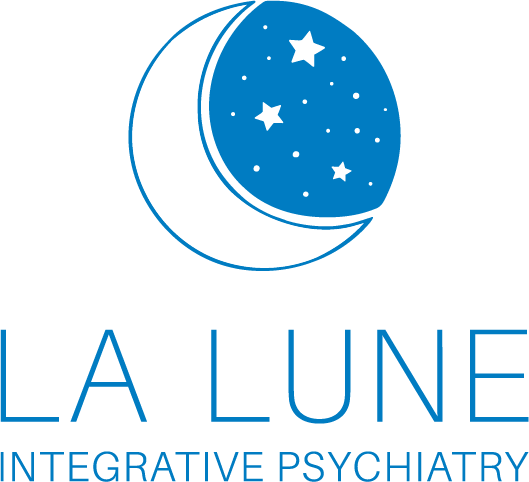Q&A with La Lune's Christopher Klebieko PMHNP-BC, DNP: Building Resilience with Small Wins
Chris Klebieko is a board-certified, doctorally-prepared psychiatric nurse practitioner and graduate of the University of Washington. He uses a holistic approach to treating mental health disorders such as depression, anxiety, ADHD, bipolar disorder, and OCD.
In this post, Chris opens up about how his research on mindfulness and exercise, after Transcranial Magnetic Stimulation (TMS) treatment for depressed mood, shaped his practice.
His philosophy is refreshingly practical: you don't need to overhaul your entire life to feel better. He focuses on identifying small, achievable goals that each patient can succeed at—because those small wins compound into bigger ones, building both confidence and long-term mental health resilience.
Christopher Klebieko PMHNP-BC, DNP // La Lune Integrative Psychiatry
You wrote your doctoral capstone on nutrition and exercise in mental health. What sparked that interest, and what surprised you most in your research?
What really drew my interest was how a little bit of exercise goes a long way and someone doesn’t have to spend hours at the gym. My research showed that even 10 minutes a day can make a noticeable difference in mood, anxiety, and overall energy.
Walk me through how you think about the relationship between lifestyle interventions and psychiatric medications. Are they complementary, or can one sometimes replace the other?
I am a firm follower and believer of lifestyle interventions, but sometimes medications are necessary. I view the two as complementary with medications creating an initial stabilization period where patients can learn, practice and engage in the therapeutic and lifestyle modifications needed for long-term stability. It is my goal to get patients to a point where medications are minimized or possibly stopped, but this needs to be determined based on a person’s individual situation. Whether or not medications become part of the long-term plan, I want my clients to come away with strong coping mechanisms and lifestyle interventions in their resilience toolbox.
“Whether or not medications become part of the long-term plan, I want my clients to come away with strong coping mechanisms and lifestyle interventions in their resilience toolbox. “ -Chris Klebieko PMHNP-BC, DNP
How do you decide which lifestyle intervention to prioritize first with a new patient?
This is complicated to answer because every individual is different and requires a specialized and unique treatment blend. The key is to identify something the client has a high chance of succeeding at and giving clients small wins. Eventually small wins compound into bigger wins and evolve into an improvement in self confidence and overall mood.
For someone who's never been active or who has a complicated relationship with exercise, how do you introduce movement as a therapeutic tool?
Exercise is a general term and can have a different meaning to each client I see. The common misconception is exercise falls under the umbrella of running, hiking, going to the gym, etc. This can be a narrow view of the topic and I find it helpful to instead join the concept of movement with each client’s lifestyle hobbies, interests and daily routine.
What are the biggest barriers patients face when trying to implement lifestyle changes alongside their mental health treatment, and how do you help them overcome those?
The first step! It is very challenging for many to start a lifestyle change even if it will benefit them. This is because we are creatures of habit, and we are all guilty of falling into unhealthy habits. Changing these habits is uncomfortable and sometimes we need someone to give us that little push to foster a new habit. This can be done by starting with small changes and highlighting the positive feelings produced by these changes. These can be held as a reminder, encouragement or motivation for continuing to enact the specific change.
How do you track whether these interventions are working? What markers or changes are you looking for?
Changes come in many forms for each client, but the common subtleties initially begin with small changes in sleep, energy levels, motivation and mood. These can be easily detected during discussion with each individual as they begin to engage more in conversation, expand on their goals and aspirations and show excitement and joy in things they are doing daily.
Are you ready to improve your resilience with a compassionate approach? Schedule your first appointment today and we’ll create a customized plan for you.
Disclaimer: This website does not provide medical advice and may be out of date. The information, including but not limited to text, PDFs, graphics, images, and other material contained on this website are for general educational purposes only. No material on this site is intended to be a substitute for professional medical advice, diagnosis, or treatment, and does not create a patient-doctor relationship. Always seek the advice of your qualified healthcare provider with any questions you may have regarding a medical condition, lifestyle or dietary changes, treatments, and before undertaking a new health care regimen. Never disregard professional medical advice or delay in seeking it because of something you have read on this website.



